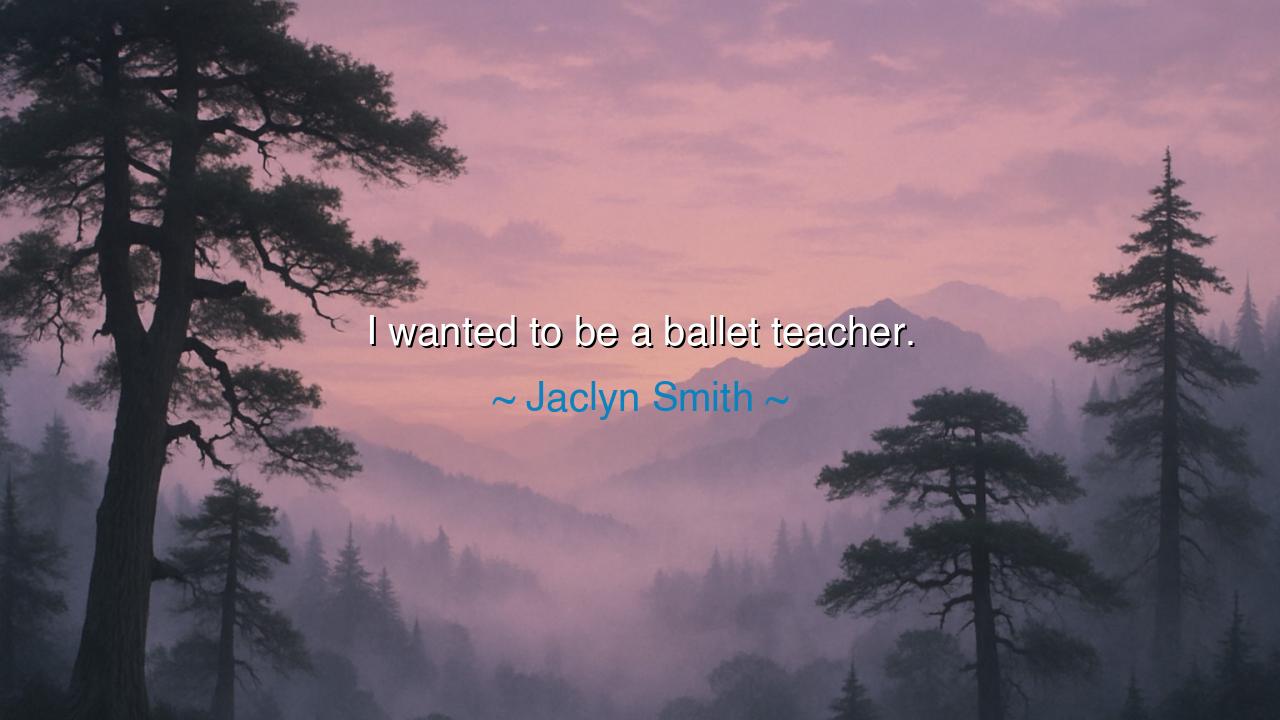
I wanted to be a ballet teacher.






In the gentle yet resolute words of Jaclyn Smith, “I wanted to be a ballet teacher.” At first glance, these words seem simple, even modest, but within them lies a dream that speaks of discipline, beauty, and the eternal yearning to guide others toward grace. For to desire not merely to dance, but to teach ballet, is to long for more than one’s own glory—it is to shape lives, to pass on the gift of art, and to preserve the ancient dialogue between body, spirit, and music.
The ballet teacher is no ordinary guide. She is both sculptor and gardener—sculptor, for she molds the body into lines of elegance, and gardener, for she tends the spirit with patience, pulling up weeds of fear, planting seeds of courage. To say, “I wanted to be a ballet teacher,” is to confess a desire not for fleeting fame upon the stage, but for the enduring legacy of passing wisdom from one generation to another. In this way, Jaclyn Smith’s words remind us of a truth the ancients always knew: that the highest calling is not to shine alone, but to kindle light in others.
Consider the tale of Anna Pavlova, one of history’s most beloved dancers. Her swan-like grace enchanted audiences across the world, yet she did not confine her art to the glittering theaters of Europe. She traveled tirelessly, bringing ballet to distant lands, teaching those who had never before seen such beauty. For Pavlova, dance was not only for personal triumph—it was a gift meant to be shared, a flame passed from hand to hand. In this, she embodied the very spirit of the ballet teacher: one who awakens the art within the hearts of others.
Jaclyn Smith herself, known widely as an actress, hints through this confession at the path not taken—the quieter, nobler ambition of nurturing others in the disciplined world of ballet. To wish for such a path is to reveal humility, for teaching requires sacrifice. The stage offers applause, but the classroom offers silence; the world may forget the teacher’s name, yet every movement, every bow, every dancer who takes flight bears the teacher’s unseen hand. Thus, the teacher lives on, woven invisibly into the future.
The ancients too understood this truth. Did not Aristotle say that he owed more to his teacher, Plato, than to all the treasures of the world? And did not Alexander, conqueror of nations, declare that he owed life to his father, but a good life to Aristotle? This is the eternal dignity of the teacher: she may not fight the wars nor wear the crown, yet her influence shapes the hands that hold the sword, the minds that govern empires, and the souls that craft beauty.
The lesson for us is clear: do not measure greatness by fame or by outward reward, but by the ability to lift others upward. To teach is to plant one’s legacy in soil that grows beyond one’s lifetime. And if your heart stirs, like Jaclyn Smith’s, with the desire to guide, then cherish that desire, for it is among the noblest paths one may walk.
In practice, this means three things: First, honor your teachers, for they gave you more than knowledge—they gave you the shaping of your very being. Second, become a teacher in your own way, whether in dance, in craft, in kindness, or in wisdom—do not hoard what you know, but share it. And third, live with patience, for teaching is the art of planting seeds whose flowers you may never see, yet whose fragrance will bless generations to come.
Thus, in Jaclyn Smith’s quiet words—“I wanted to be a ballet teacher”—there resounds an eternal truth: that to guide another in grace is itself the highest form of grace. And though the stage may dazzle and fade, the lesson imparted by a true teacher endures, echoing like a gentle melody in the hearts of all who have learned to dance not only with their feet, but with their souls.






AAdministratorAdministrator
Welcome, honored guests. Please leave a comment, we will respond soon